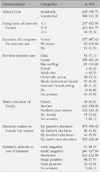Abstract
Purpose
The Purpose of this study is to investigate th relations among ego identity, stress, and internet addiction in high school students.
Methods
In order to get the data by self-questionnaire, 750 subject were selected from Aug. 20 to Aug. 31, 2008. The data was analyzed by percentage, mean, standard deviation, t-test, one-way ANOVA, Pearson's correlation coefficient, and multiple regression using SPSS/WIN 12.0 program.
Results
Ego identity scores were 39.54, stress scores were 64.68, internet addiction scores were 65.34. There were significantly negative correlations between ego identity and stress, between ego identity and internet addiction. But there was significantly positive correlation between stress and internet addiction. Multiple regression analysis revealed that the most powerful predictor of internet addiction was stress related to individual.
Figures and Tables
References
1. Cho HR. A study on the influence youth volunteer activities in ego-identity and moral development of adolescents. Seoul: Yonsei University;1996. Unpublished doctoral dissertation.
2. Cho YR, Lee HJ. A study on a model for internet addiction of adolescents. J Korean Acad Nurs. 2004; 34(3):541–551.

3. Erickson EH. The life cycle completed: Review. New York: Norton;1982.
4. Frick PJ. Family dysfunction and the disruptive behavior disorder: A review of recent empirical findings. Adv Clin Child Psychol. 1994; 16(2):203–226.
5. Greenberg MT, Speltz ML, Deklyen M. The role of attachment in the early development of disruptive behavior problem. Dev Psychopathol. 1993; 5(1):119–213.
6. Han MY. Relationships among adolescents' internet addiction, individual psychology and family. Peer environment variables. Seoul: Chung-Ang University;2006. Unpublished master's thesis.
7. Hwang SM, Hwang HY, Lee SJ. A study internet addiction status and actual conditions. Seoul: National Information Society Agency of Korea;2001.
8. Ju SJ. Internet addiction and Psychological factors in early adolescents. J Korean Acad Psychiatr Ment Health Nurs. 2008; 17(1):46–54.
9. June KJ, Sohn SY, So AY, Yi GM, Park SH. A study of factors that influence internet addiction, smoking, and drinking in high school students. J Korean Acad Nurs. 2007; 37(6):872–882.

10. Kim KL. The study adolescence's internet addiction tendency and family communication and family functioning. Gwangju: Chonnam National University;2007. Unpublished master's thesis.
11. Korea Youth Counseling Institute. PC addiction of adolescents. Seoul: Author;2000.
12. Lam LT, Peng GW, Mai JC, Jing J. Factors associated with internet addiction among adolescents. Cyberpsychol Behav. 2009; 12(5):551–555.

13. Lee DS. A study on the relations of internet addiction, depression and ego identity of Adolescents. Gwangju: Chonnam National University;2003. Unpublished master's thesis.
14. Lee KH, Hong JH. The analysis of stress factors affecting internet addiction of middle school students. J Fish Mar Sci Educ. 2005; 17(1):48–57.
15. Lee KW. The study on internet addiction of adolescent. Seoul: Ewha Womans University;2001. Unpublished doctoral dissertation.
16. Lee MS, Kim KY, Ko KJ, Lee HJ, Nam W, Kim EY, et al. A study on the related factors with internet addiction of the 11th grade students in an urban area. Korean J Prev Med. 2003; 36(4):390–398.
17. Lee SJ. A Study on the factors effecting the internet addiction of the adolescents. Seoul: Kyonggi University;2008. Unpublished doctoral dissertation.
18. Lee SS, Je MS. The factors related to stress among high school students. J Korean Soc Matern Child Health. 2008; 12(1):47–58.

19. Lee ST. Effect of students stress factors and methods to overcome stresses on their gloom. Daegu: Keimyung University;2001. Unpublished master's thesis.
20. Lee YM. A study on stress and cognitive appraisal of adolescents. Seoul: Sookmyung women's University;1994. Unpublished master's thesis.
21. National Information Society Agency of Korea. Internet addiction self report-Korea, NIA. 2002. Retrieved Jan 16, 2007. form http://www.nia.or.kr/index.aspx?portallD=ko.
22. Park AC. A study on the relations between identity negotiation process and well-being. Korean J Educ Psychol. 2002; 16(4):207–228.
23. Park HS. The influence of ego-identity and depression on suicidal ideation for Korean adolescents. J Korean Acad Psychiatr Ment Health Nurs. 2007; 16(2):103–112.
24. Ryu EJ, Choi KS, Seo JS, Nam BW. The relationships of internet addiction, depression and suicidal ideation in adolescents. J Korean Acad Nurs. 2004; 34(1):102–110.

25. Seo MA. Correlation of internet addiction, peer attachment, and coping with school life among middle school students. J Korean Acad Psychiatr Ment Health Nurs. 2007; 16(1):5–13.
26. Sinha R. Chronic stress, drug use, and vulnerability to addiction. Ann N Y Acad Sci. 2008; 1141:105–130.

27. So BH. A study on the relationships in the method of coping with the stress and the perceptible level of stress by internet addictive users' among youth. Seoul: Sungkyunkwan University;2005. Unpublished master's thesis.
28. Yeom YN. Factors influencing internet addiction in high school students. Gwangju: Chonnam National University;2007. Unpublished master's thesis.
29. Yoon HM. Variables as related to internet usage, aggression and internet addiction of adolescent. Seoul: Ewha Womans University;2005. Unpublished master's thesis.




 PDF
PDF ePub
ePub Citation
Citation Print
Print









 XML Download
XML Download